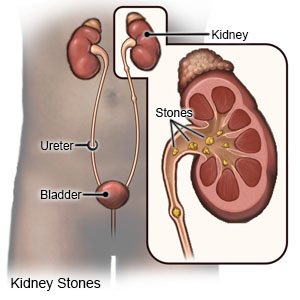Kidney Stones in Children
Medically reviewed by Drugs.com. Last updated on Apr 6, 2025.
Kidney stones form in the urinary system when the water and waste in your child's urine are out of balance. When this happens, certain types of waste crystals separate from the urine. The crystals build up and form kidney stones. Kidney stones can be made of uric acid, calcium, phosphate, or oxalate crystals. Your child may have more than one kidney stone.
 |
WHILE YOU ARE HERE:
Informed consent
is a legal document that explains the tests, treatments, or procedures that your child may need. Informed consent means you understand what will be done and can make decisions about what you want. You give your permission when you sign the consent form. You can have someone sign this form for you if you are not able to sign it. You have the right to understand your child's medical care in words you know. Before you sign the consent form, understand the risks and benefits of what will be done to your child. Make sure all of your questions are answered.
An IV
is a small tube placed in your child's vein that is used to give medicine or liquids.
Medicine:
- NSAIDs help decrease swelling and pain.
- Prescription pain medicine may be given. Do not wait until your child's pain is severe before you ask for more medicine.
- Medicines to balance your child's electrolytes may be needed.
Tests:
- Urine tests may show if your child has blood in his or her urine. They may also show high amounts of the substances that form kidney stones, such as uric acid.
- Blood tests show how well your child's kidneys are working. They may also be used to check the levels of calcium or uric acid in your child's blood.
- X-ray or ultrasound pictures may be taken of your child's kidneys, bladder, and ureters. Your child may be given contrast liquid before an x-ray to help these show up better in the pictures. Your child may need to have more than one x-ray. Tell the healthcare provider if your child has ever had an allergic reaction to contrast liquid.
Treatment:
Your child may need any of the following if the kidney stones are too large to pass:
- Lithotripsy is a procedure that uses shock waves to break up the stones. Pieces of the stones can then pass in your child's urine.
- Nephrolithotomy is surgery to remove the kidney stones.
- Ureteroscopic kidney stone removal is a procedure to remove the kidney stones.
Treatment options
The following list of medications are related to or used in the treatment of this condition.
RISKS:
Your child may get more kidney stones, even after treatment. Kidney stones can cause an infection. Without treatment, kidney stones may cause a blockage in your child's kidney or ureters. This can block the flow of urine and lead to kidney damage or failure.
CARE AGREEMENT:
You have the right to help plan your child's care. Learn about your child's health condition and how it may be treated. Discuss treatment options with your child's healthcare providers to decide what care you want for your child.© Copyright Merative 2025 Information is for End User's use only and may not be sold, redistributed or otherwise used for commercial purposes.
The above information is an educational aid only. It is not intended as medical advice for individual conditions or treatments. Talk to your doctor, nurse or pharmacist before following any medical regimen to see if it is safe and effective for you.
Learn more about Kidney Stones
Treatment options
Symptoms and treatments
Medicine.com guides (external)
Further information
Always consult your healthcare provider to ensure the information displayed on this page applies to your personal circumstances.
